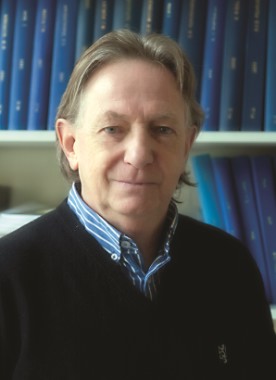User login
SYDNEY, AUSTRALIA – Dopaminergic therapy has seen its heyday, and the time has come to look to other neurotransmitter systems for effective treatments for the nonmotor symptoms of Parkinson’s disease, a leading pharmacologist said.
Delivering the C. David Marsden lecture at the international congress of Parkinson’s Disease and Movement Disorders, Peter Jenner, Ph.D., said that Parkinson’s disease needs to be looked at as a multisystem, multibiochemical disorder, and many of the problems associated with the disease originate in areas of the brain that do not use dopamine as a neurotransmitter.
"We’re locked into this dopamine time warp and I’m not sure there’s much to be gained by pushing forward with new dopaminergic therapies," said Dr. Jenner of the Institute of Pharmaceutical Science at King’s College London.
"We can make them last longer, we can deliver them in different ways, we could probably reduce people’s amount of off time, but in terms of a big step forward, I doubt we’re going to get that out of dopaminergic therapy," he said in an interview.
The problem is that dopaminergic therapy has been so effective in dealing with the motor symptoms of Parkinson’s disease that it has exposed inadequacies in the treatment of nonmotor symptoms such as depression, sensory changes, sleep disturbance, fatigue, and apathy.
"In previous eras, people with Parkinson’s disease had a shortened life expectancy because their motor system didn’t work, they got hospitalized, they got bronchopneumonia, and they died," Dr. Jenner said. "Now we keep them going longer, and now we see that dementia is a very significant problem in the majority of older patients with Parkinson’s disease, and we never saw this before because they died before they got to that point in the illness."
Dr. Jenner suggested that adenosine antagonists and anticholinergic therapies could have potential as alternatives to the dopaminergic focus of current treatments.
Adenosine antagonists have had mixed results, Dr. Jenner said, pointing to the repeated failure in phase III trials of the A2A receptor antagonist preladenant after promising results in phase II trials, while another A2A receptor antagonist istradefylline has been approved in Japan as an adjunct treatment for Parkinson’s disease.
Anticholinergic therapies such as orphenadrine, procyclidine, and trihexyphenidyl are still available and effective but are not often used because of their side effect profile. As this class of drugs was developed several decades ago, there are few modern clinical trials on them, Dr. Jenner said.
"Since they were discovered, we now know there are multiple subtypes of muscarinic receptors and nobody’s gone back to try and target the one that seems to be significant in the motor system," namely, the M4 receptor, he said.
Despite the current shortfall in effective treatments for nonmotor Parkinson’s symptoms, Dr. Jenner said he was optimistic that progress would soon be made because of the growing awareness of the burden of nonmotor symptoms.
"People are going to wake up to the fact that their clinics, their beds in hospitals, and the beds in nursing homes are full of people with Parkinson’s disease because of nonmotor symptoms, and nonmotor is the biggest cause of people having to go into residential care, and it’s the biggest determinant of disease outcome," he said.
Dr. Jenner said he did not have any relevant financial disclosures.
SYDNEY, AUSTRALIA – Dopaminergic therapy has seen its heyday, and the time has come to look to other neurotransmitter systems for effective treatments for the nonmotor symptoms of Parkinson’s disease, a leading pharmacologist said.
Delivering the C. David Marsden lecture at the international congress of Parkinson’s Disease and Movement Disorders, Peter Jenner, Ph.D., said that Parkinson’s disease needs to be looked at as a multisystem, multibiochemical disorder, and many of the problems associated with the disease originate in areas of the brain that do not use dopamine as a neurotransmitter.
"We’re locked into this dopamine time warp and I’m not sure there’s much to be gained by pushing forward with new dopaminergic therapies," said Dr. Jenner of the Institute of Pharmaceutical Science at King’s College London.
"We can make them last longer, we can deliver them in different ways, we could probably reduce people’s amount of off time, but in terms of a big step forward, I doubt we’re going to get that out of dopaminergic therapy," he said in an interview.
The problem is that dopaminergic therapy has been so effective in dealing with the motor symptoms of Parkinson’s disease that it has exposed inadequacies in the treatment of nonmotor symptoms such as depression, sensory changes, sleep disturbance, fatigue, and apathy.
"In previous eras, people with Parkinson’s disease had a shortened life expectancy because their motor system didn’t work, they got hospitalized, they got bronchopneumonia, and they died," Dr. Jenner said. "Now we keep them going longer, and now we see that dementia is a very significant problem in the majority of older patients with Parkinson’s disease, and we never saw this before because they died before they got to that point in the illness."
Dr. Jenner suggested that adenosine antagonists and anticholinergic therapies could have potential as alternatives to the dopaminergic focus of current treatments.
Adenosine antagonists have had mixed results, Dr. Jenner said, pointing to the repeated failure in phase III trials of the A2A receptor antagonist preladenant after promising results in phase II trials, while another A2A receptor antagonist istradefylline has been approved in Japan as an adjunct treatment for Parkinson’s disease.
Anticholinergic therapies such as orphenadrine, procyclidine, and trihexyphenidyl are still available and effective but are not often used because of their side effect profile. As this class of drugs was developed several decades ago, there are few modern clinical trials on them, Dr. Jenner said.
"Since they were discovered, we now know there are multiple subtypes of muscarinic receptors and nobody’s gone back to try and target the one that seems to be significant in the motor system," namely, the M4 receptor, he said.
Despite the current shortfall in effective treatments for nonmotor Parkinson’s symptoms, Dr. Jenner said he was optimistic that progress would soon be made because of the growing awareness of the burden of nonmotor symptoms.
"People are going to wake up to the fact that their clinics, their beds in hospitals, and the beds in nursing homes are full of people with Parkinson’s disease because of nonmotor symptoms, and nonmotor is the biggest cause of people having to go into residential care, and it’s the biggest determinant of disease outcome," he said.
Dr. Jenner said he did not have any relevant financial disclosures.
SYDNEY, AUSTRALIA – Dopaminergic therapy has seen its heyday, and the time has come to look to other neurotransmitter systems for effective treatments for the nonmotor symptoms of Parkinson’s disease, a leading pharmacologist said.
Delivering the C. David Marsden lecture at the international congress of Parkinson’s Disease and Movement Disorders, Peter Jenner, Ph.D., said that Parkinson’s disease needs to be looked at as a multisystem, multibiochemical disorder, and many of the problems associated with the disease originate in areas of the brain that do not use dopamine as a neurotransmitter.
"We’re locked into this dopamine time warp and I’m not sure there’s much to be gained by pushing forward with new dopaminergic therapies," said Dr. Jenner of the Institute of Pharmaceutical Science at King’s College London.
"We can make them last longer, we can deliver them in different ways, we could probably reduce people’s amount of off time, but in terms of a big step forward, I doubt we’re going to get that out of dopaminergic therapy," he said in an interview.
The problem is that dopaminergic therapy has been so effective in dealing with the motor symptoms of Parkinson’s disease that it has exposed inadequacies in the treatment of nonmotor symptoms such as depression, sensory changes, sleep disturbance, fatigue, and apathy.
"In previous eras, people with Parkinson’s disease had a shortened life expectancy because their motor system didn’t work, they got hospitalized, they got bronchopneumonia, and they died," Dr. Jenner said. "Now we keep them going longer, and now we see that dementia is a very significant problem in the majority of older patients with Parkinson’s disease, and we never saw this before because they died before they got to that point in the illness."
Dr. Jenner suggested that adenosine antagonists and anticholinergic therapies could have potential as alternatives to the dopaminergic focus of current treatments.
Adenosine antagonists have had mixed results, Dr. Jenner said, pointing to the repeated failure in phase III trials of the A2A receptor antagonist preladenant after promising results in phase II trials, while another A2A receptor antagonist istradefylline has been approved in Japan as an adjunct treatment for Parkinson’s disease.
Anticholinergic therapies such as orphenadrine, procyclidine, and trihexyphenidyl are still available and effective but are not often used because of their side effect profile. As this class of drugs was developed several decades ago, there are few modern clinical trials on them, Dr. Jenner said.
"Since they were discovered, we now know there are multiple subtypes of muscarinic receptors and nobody’s gone back to try and target the one that seems to be significant in the motor system," namely, the M4 receptor, he said.
Despite the current shortfall in effective treatments for nonmotor Parkinson’s symptoms, Dr. Jenner said he was optimistic that progress would soon be made because of the growing awareness of the burden of nonmotor symptoms.
"People are going to wake up to the fact that their clinics, their beds in hospitals, and the beds in nursing homes are full of people with Parkinson’s disease because of nonmotor symptoms, and nonmotor is the biggest cause of people having to go into residential care, and it’s the biggest determinant of disease outcome," he said.
Dr. Jenner said he did not have any relevant financial disclosures.
AT THE 2013 MDS INTERNATIONAL CONGRESS

